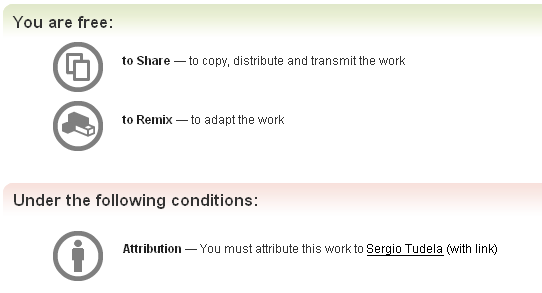A Creative Commons license is an simple way to encourage others to share, remix, and reuse your digital content. If you’re publishing material of any variety to the web and looking to have it spread, licensing your work under Creative Commons is smart as it actively encourages sharing with permission and attribution.
“Obscurity is a far greater threat to authors and creative artists than piracy.” —Tim Oriely
With the release of Chris Anderson’s new book, Free: The Future of a Radical Price there is a heated debate going around the web about the idea of free. I’m not going to get into the economics of free, but purely from a marketing perspective, free is the great equalizer. Especially when talking about digital content, talented producers can leapfrog gatekeepers and get noticed fast. Creative Commons was designed to work with what the web naturally does, and that’s share the best content freely without resistance.

A CC license bridges the gap between full copyright and the public domain. Essentially moving content from all rights reserved to “some rights reserved.” CC is not a replacement for copyright, rather, it allows you to modify your copyright terms so your work can succeed in a digital world, legally.
In plain English, what a Creative Commons license says is “it’s okay to use my content (in x way), but you must attribute in the following manner.” Making people feel good about reusing your content only encourages more of it.
Visual artists, bloggers, musicians, photographers, podcasters, businesses and everyone in between can benefit from CC, especially when you consider that adding a CC license to your work is in essence a marketing tool. On the web, social sharing of content is the most organic form of PR there is, word of mouth, so it makes sense that content producers should take control of how their material is shared.
Realize others are going to reuse your content no matter what, especially if it is of high quality. By trying to go against that, you are fighting a losing battle and will only engage in a game of digital whack-a-mole, as we’re witnessing the music industry going through right now. Instead of going against the fact that the web lives and breathes the open sharing of everything, embrace it as a promotions tool.
Tangible marketing benefits from a CC license include:
SEO benefit
Releasing content under a Creative Commons license gives you, the content creator, full control over how you’d like your content attributed. As part of the process, attribution is required with a link. This is completely organic, as it is a legal reusing, remixing, and sharing of content on user’s own rendition without having to contact the content creator directly, or vice versa. The neat part about a CC license is you, the content creator, get to define how this attribution takes place.
Here’s the license page of the image of the ocean shown in this post. The artist set the following for attribution:

Sergio Tudela, creator of the image, has a homepage, yet his Flickr page is getting all the links and attention. He could easily change his CC attribution page, and link to his homepage instead of Flickr. From an SEO perspective, this makes a lot of sense, and he could make it as simple as this:

Clearly explain to people on both the page which hosts your content and the CC license page how you want them to link to you and attribute, and they must do so to use your material. Even if not everyone follows your instructions precisely, you’re still going to get plenty of link-love here, a CC license encourages natural sharing (with attribution) of good content.
Encouragement for influencers/professionals to use your material
As blogs increase not just in number, but in maturity, more and more are seeing their blogs as vital digital assets they want to follow all the rules on. It is becoming less of a “wild west” and more a formal publishing arena. Thus, many influential bloggers are careful not to infringe on copyrights for fear of lawsuits or DMCA take-downs. Why not use a CC license and make it 100% clear it’s okay to reuse your content on their blogs, just please attribute properly. The people you actually want linking to you, those with credible reputations and trust, will always comply with such requests.
As new business models are emerging from the idea of “free,” success stories are PR-worthy
When you have success using free as a promotions tool, capitalize on it for PR. Tech and marketing bloggers, business writers and even traditional media are interested in compelling stories of free. It’s a hot trend now and into the future.
Social proofing
Release content under CC, and then aggregate all the shares together in one spot as clear social proof of the value of your work. That social proofing can be used as leverage to achieve end business objectives.
Samples of success
Let’s look at just a few quick samples of Creative Commons success:
Fabian Scherschel and Dan Lynch created a tremendously successful podcast called Linux Outlaws through freely licensed content:
A vibrant community formed surrounding the show, spread among the Linux Outlaws Forums, multiple social networks and the #linuxoutlaws IRC channel on the Freenode network.
Using a Creative Commons license has enabled Linux Outlaws to grow way beyond anything its creators could ever have imagined and has created a vibrant and active community of listeners and fans. This surprising success of the show would never have been possible without the ability, and explicit encouragement, to share the content freely in every way possible.
Jonathan Coulton licensed his music under Creative Commons to try and break through as an artist:
Some of his songs have been downloaded hundreds of thousands of times, and 45% of his income in 2007 was from paid digital downloads (Interview by James Milsom with Jonathan Coulton via email, 5 April 2008). This evidences the success Jonathan has had through the use of Creative Commons licences facilitating the ability to give content away for free. Jonathan’s content has been used in music videos made by fans and posted on Youtube, subsequently receiving (in some cases) over a million hits. Fans have also created cover versions of his songs, artwork, dances, plays, card games and even guitar instructional videos. Coulton says that this sort of outcome is very satisfying and validating, but more importantly from a business point of view, such enthusiasm from fans has meant that he has received a great amount of free publicity.
Mike Seyfang is an Australian education consultant, ICT strategist, amateur musician and notes:
What I do crave is recognition (not fame). The most profound recognition I have experienced is when someone mashes up or remixes my work. Like this, this, this, this or this. The biggest risk to me is that nobody will ever find my remixable digital work – or if they do that they might not have confidence to use it (ie that they might feel they need to ask permission first). Either way I gain more than I lose by having my work re-mixed into a new context. Had I licensed my work in a more restrictive way it is unlikely that anyone would have found it, let alone re-used it.
One more, as I walk the talk here – read what Cameron Parkins observed about my experience using Creative Commons as an artist and online marketer.
Next steps…
Take the time to learn more about the specific licenses and then register one for your work (it’s free). I suggest selecting an attribution or attribution share-alike license if you’re interested in the widest exposure possible.



